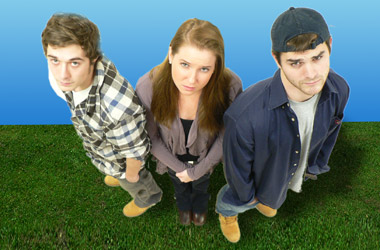Talk about metatheater. Middletown is so conscious of its own existence that the script even includes an intermission, with audience members discussing the show. Playwright Will Eno, who’s been described as “a Samuel Beckett for the Jon Stewart generation,” gives a contemporary twist to Thornton Wilder’s nostalgic classic Our Town—itself an often under-appreciated pioneer of self-aware theater—and turns that slice of small-town life inside out.
Like Wilder, Eno has a narrator—in this case, a laconic cop—who leads the audience through the everyday life of this archetypally ordinary town and introduces us to a cross-section of its inhabitants. They include a pregnant newcomer to town, her terminally melancholy neighbor, a hapless mechanic, the local librarian and a tour guide to the town’s eye-glazingly humdrum history. The episodic action is by turns humorous, whimsical, satirical, surreal and poignant.
Martin Shell is staging the area premiere of Middletown at Springfield College this weekend. I recently caught him between rehearsals.
*
What is it about this quirky script that attracted you, besides its quirks?
Martin Shell: It’s a really beautifully written play, keenly aware of its own exposed theatricality and its somewhat subversive treatment of audience expectations, at the same time as it rewards us with sweet and odd humor, and sympathetic, likable characters. I was immediately attracted to the characters’ wonderful lyrical and loopy language and thought process. My students call it “random,” even “weird.” At the same time, it feels very everyday, very familiar, and yet evocative of that mysterious experience when you’re sensitive to something larger, something maybe more beautiful or somehow eternal in your life.
At the end of Our Town, Emily asks, “Do human beings ever realize life while they live it, every, every minute?” And the answer is, mostly, no. But the people here are almost excruciatingly aware of their lives and their speck-like place in the universe.
Wilder’s people are too caught up in life to see how mysterious and wonderful and beautiful it is. By contrast, the people in Middletown are sometimes so aware that life is larger than they are that they get lost in it—awkward, anxious, lonely. Just being a person feels pathetic, comic, by definition incomplete and full of yearning. Well, I can’t get enough of that!
The language, as you say, is “lyrical and loopy.” Time after time, ordinary conversations spiral off into whimsical reflections on what another “loopy” writer, Douglas Adams, distilled as “life, the universe and everything.“
My students keep noticing how the conversations are like the ones they have all the time, but then sparking up these flashes of universals, spiritual intimations. Like when you and another person share feelings of astonishment, or awe. Or try to. Words struggle to express it. Wanting to connect with others in the midst of the sometimes overwhelming confusion of life is just as basic as it gets.
Your cast is half students and half faculty and staff—representing, I guess, the self-contained world of the campus, paralleling the play’s small-town world.
Yes. We’re a community of people exploring this oddball community of characters, to share with the community of our audiences. For me, that’s theater.
Middletown: March 29-31, 8 p.m., $2-5 donation, April 1, 2 p.m., Fuller Arts Center, Wilbraham Ave., Springfield College, www.spfldcol.edu.
Contact Chris Rohmann at StageStruck@crocker.com.



